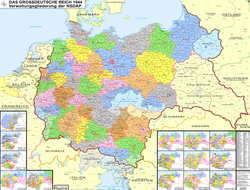Reichsgau Carinthia
| Reichsgau Kärnten | ||||||
| Reichsgau of Nazi Germany | ||||||
|
||||||
|
||||||
|
Map of Nazi Germany showing its administrative subdivisions (Gaue and Reichsgaue). |
||||||
| Capital | Klagenfurt | |||||
| Gauleiter | ||||||
| • | 1938–1939 | Hubert Klausner | ||||
| • | 1940–1941 | Franz Kutschera | ||||
| • | 1941–1945 | Friedrich Rainer | ||||
| History | ||||||
| • | Anschluss | 12 March 1938 | ||||
| • | German surrender | 8 May 1945 | ||||
| Population | ||||||
| • | 1939 | 451,028 | ||||
| Today part of |
|
|||||
The Reichsgau Kärnten (English: Gau Carinthia) was an administrative division of Nazi Germany in Carinthia and East Tyrol (both in Austria) and Upper Carniola in Slovenia. It existed from 1938 to 1945.
It was responsible for the administration of the de facto annexed Operational Zone of the Adriatic Littoral (Operationszone Adriatisches Küstenland, OZAK).
The Nazi Gau (plural Gaue) system was originally established in a party conference on 22 May 1926, in order to improve administration of the party structure. From 1933 onwards, after the Nazi seizure of power, the Gaue increasingly replaced the German states as administrative subdivisions in Germany. In 1938 Nazi Germany annexed Austria, with the latter being sub-divided into Reichsgaue.
At the head of each Gau stood a Gauleiter, a position which became increasingly more powerful, especially after the outbreak of the Second World War. Local Gauleiter were in charge of propaganda and surveillance and, from September 1944 onwards, the Volkssturm and the defence of the Gau.
The position of Gauleiter in Kärnten initially was held by Hubert Klausner from 1938 to 1939. Franz Kutschera was acting Gauleiter from 1939 to 1941, followed by Friedrich Rainer from 1941 to 1945.
...
Wikipedia



